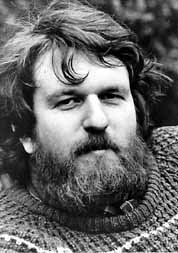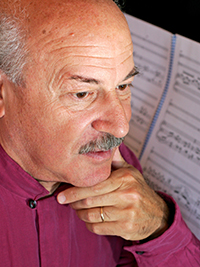By Stephen Brookes • The Washington Post • April 13, 2014
The celebrated British composer Oliver Knussen was in town last week for a series of concerts and workshops at the Library of Congress, and it was impossible to come away without a renewed appreciation of his profound impact on contemporary music — not only as a composer, but also as a conductor and curator. That impact was clear Friday night, when the Birmingham Contemporary Music Group  Oliver Knussen(joined by pianist Huw Watkins) put on an insightful, carefully chosen program that tied Knussen’s music to chamber works from the past hundred years — and featured the world premiere of a fine new piece from the American composer Marc Neikrug.
Oliver Knussen(joined by pianist Huw Watkins) put on an insightful, carefully chosen program that tied Knussen’s music to chamber works from the past hundred years — and featured the world premiere of a fine new piece from the American composer Marc Neikrug.
Benjamin Britten was only a teenager when he wrote his “Phantasy, Op. 2,” but you’d never suspect it; it’s a work of warm and sometimes unsettling beauty for oboe and string trio, and Melinda Maxwell played the songlike oboe line (which seemed to float over an often martial, drum-like pulse) with great tenderness. That youthful work was followed by Elliott Carter’s “Epigrams,” written just before the composer’s death two years ago at 103. Age never really diminished Carter’s gigantic mind, and these 12 compressed, complex works are full of surprises and sharp-edged wit — although it’s hard not to hear them as a sort of farewell, and poignant in their own dry-eyed way. Marc NiekrugNeikrug’s “Tiger’s Nest” for piano trio (commissioned by the Library and dedicated to Knussen) takes its title from a Buddhist monastery perched on a remote cliff in Bhutan. It’s a place Neikrug says leaves you with “a very particular and poignant feeling,” and the same could be said of the music, which evokes a sense of timelessness and immense space, where natural forces erupt and fall away in a constantly shifting interplay; a kind of meditation on the universe.
Marc NiekrugNeikrug’s “Tiger’s Nest” for piano trio (commissioned by the Library and dedicated to Knussen) takes its title from a Buddhist monastery perched on a remote cliff in Bhutan. It’s a place Neikrug says leaves you with “a very particular and poignant feeling,” and the same could be said of the music, which evokes a sense of timelessness and immense space, where natural forces erupt and fall away in a constantly shifting interplay; a kind of meditation on the universe.
Hans Werner Henze’s luminous “Adagio adagio” from 1993 and Frank Bridge’s “Piano Trio No. 2” — a work of lyrical modernism from 1929 — made up the rest of the program. But to these ears, it was Knussen’s own “Cantata (Triptych, Part 3)” for oboe and string trio that provided the most colorful and engaging music of the evening. Like Carter, Knussen writes exceptionally concise and intricate music but with far more charm and natural warmth, and “Cantata” proved to be an absolutely beguiling work. The Birmingham players — who performed with refined musicianship all evening — gave it a spirited and spectacularly detailed reading.